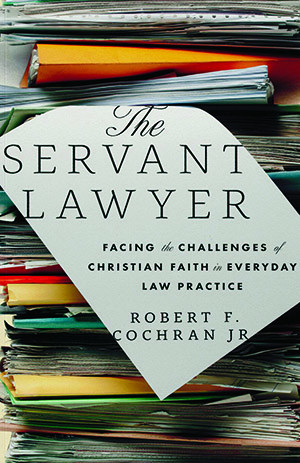Common Good: Can you give a 30,000-foot description of the actual work of a lawyer?
Robert F. Cochran Jr.: It is not surprising that trial lawyers get the most attention. Litigation is exciting. When I was a young boy, the Perry Mason show inspired me to become a lawyer. At the end of each episode, the bad guy, under Mason’s grueling cross-examination, confessed to committing murder. Exciting, but a long way from reality. But real law practice is exciting, too.
God intends law to be a structure of love. Law’s purpose is to enable human flourishing, and lawyers get to play an important part in the legal system. Business lawyers create business arrangements that provide people with jobs and products and services. Trial lawyers assist in the search for justice. Some lawyers pursue justice directly, doing human-rights work, protecting religious freedom, and representing Christian organizations. Other lawyers pursue justice indirectly, making arguments on behalf of clients in the hope that the arguments on both sides of a case will enable judges and juries to discern truth and justice.
In addition, many people will be surprised to learn that most lawyers’ work is some form of peacemaking. Good business lawyers and estate lawyers draft legal documents with an eye toward avoiding conflict. Trial lawyers settle 95 percent of cases prior to trial, and even litigation is a peaceful form of conflict resolution when compared with its violent alternatives.
In your new book, you address “challenges” in the practice of law for Christians. What kinds of challenges?
Some of the challenges lawyers face arise because they represent clients. After representing many clients — sometimes challenging clients — there is a temptation to depersonalize clients, to see a client as merely this potential recovery, this complicated estate plan, or this source of irritation. Christian lawyers need to love and serve clients, from the lowliest criminal defendant to the most arrogant CEO. Often clients are caught up in the emotions of a case, and lawyers bring objectivity to the decision-making process. In some situations, when the lawyer sees a client going down a wrong road, the lawyer needs to challenge that client.
Lawyers also face challenges in dealing with opposing lawyers. Hopefully, negotiations will yield a peaceful, fair settlement, but lawyers can be obstinate. Lawyers should pursue peace, but they cannot be afraid of conflict. There is “a time for peace,” but there is also “a time for war” (Eccl 3:8). At times, lawyers who are gentle and peace-loving need to push against their gentle, peaceful instincts. Some clients need justice.
Some challenges arise because the nature of a lawyer’s work can affect the lawyer’s character. Much of a lawyer’s work arises because of the fallen nature of humanity and lawyers can become cynical. Lawyers are often surrounded by wealthy people and lawyers can become envious. Lawyers exercise power and they can become arrogant. Lawyers do hard, stressful work and they can suffer from burnout.
What does it mean to be a “servant lawyer”?
A servant lawyer recognizes that God calls his followers, not to “lord it over” people, but to serve them (Matt 20:25-28). Lawyers serve individual clients by loving them, by speaking for them, by standing with them during the most stressful times in their lives, when everyone else has abandoned them. Lawyers also serve people more generally, by playing an important role in a system that seeks truth and justice.
